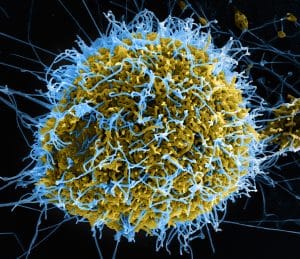
In mid-August 2019, human clinical trials were halted in the current Ebola epidemic that has claimed more than 2,100 lives in Africa. The findings resulted in the discontinuation of two of the drugs in the trial. Future patients will be randomly assigned to receive either REGN-EB3 (Regeneron) or mAb114 (Ridgeback Biotherapeutics) in an extension phase of the study. Texas Biomedical Research Institute scientists in the Institute’s Biosafety Level 4 contract research program conducted preclinical testing of several of the compounds in the trial, working with Regeneron and the Biomedical Advanced Research and Development Authority (BARDA).
“Preclinical data showed each of these compounds to be efficacious to some degree,” explained Ricardo Carrion, Jr., Ph.D., Professor and Director of Texas Biomed’s BSL-4 Contract Research Program. “We are motivated by the promise of these drugs and are happy to see that patients are recovering, as that is always the goal of our science – to positively impact human lives.”
Ebola is a filovirus that causes severe hemorrhagic fever and is fatal in about half of cases. Ebola virus is one of the deadlier pathogens studied in the Biosafety Level 4 Laboratory at Texas Biomed. Scientists put in a competitive bid to use nonhuman primates to help determine the effectiveness of each of these experimental Ebola treatments. Well-documented, controlled studies involving animals are critical to licensure of Ebola therapies by the Food and Drug Administration (FDA). Texas Biomed is the only private biomedical research institute in the world with both a National Primate Research Center and a Level 4 Biosafety Lab.

The Centers for Disease Control and Prevention (CDC) classified Ebola as a Category A Bioterrorism Disease. That means the virus can be easily transmitted from person to person, results in a high mortality rate, could cause public panic and social disruption, and requires preparation for a response.
“It is exciting that we are moving closer to a potential cure for Ebola virus, and we are simply proud to have played a role in working with the organizations developing these therapies” said Dr. Carrion. “It is important we continue studying the underlying mechanisms behind the virus to develop even better therapeutics. Having more than one therapy against a disease is always the best option, so further studies should continue.”
This project has been funded in part with federal funds from the Biomedical Advanced Research and Development Authority (BARDA), under the Assistant Secretary for Preparedness and Response, within the U.S. Department of Health and Human Services, under USG Contract No. HHSO100201100013I. Some funding was provided as part of a subcontract with Battelle and IIT Research Institute.